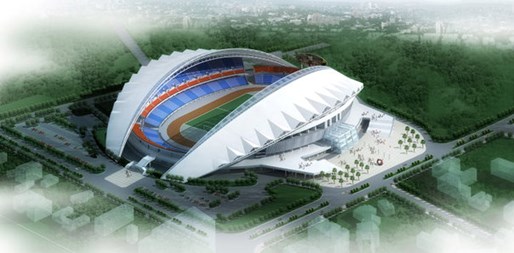China in diplomatic stadium offensive

The new national stadium in Costa Rica, Estadio Nacional, funded by China. Photo from Estadio Nacional de Costa Rica's Facebook page.
02.05.2011
By Ditte ToftA ceremony flanked by both Costa Rican and Chinese culture, followed by a friendly match between the two nations marked the opening of the new national stadium in Costa Rica in late March.
The stadium which seats 35,000 spectators built at a cost of nearly 100 million US dollars is paid for by China as a symbol of friendship between the two countries.
Costa Rica's prestigious stadium construction is the latest in a long series of stadia which China has financed and built as part of what has been dubbed China's 'stadium diplomacy'. The expression covers third world countries and especially countries from the African continent being targets for large-scale Chinese-funded stadium projects.
Stadium investments are used to form so-called 'informal friendships' between the countries in question. But beneath the surface far more serious political interests are at stake: The offers on prestigious stadium projects, which leaders of the receiving countries can bask in, are primarily a way for China to get a foothold in a new market.
A battle for resources and markets
This is especially the case in countries with rich natural resources on the African continent.
A recent example is Angola, a country with important oil resources, which both the U.S. and China are interested in. The football blog 'Pitch Invasion' refers to the New York Times’ description of Angola as a crucial battleground between the two nations during the U.S. Secretary of State Hillary Clinton's visit to the country in 2009.
Angola received the support of China to build no less than four football stadia for the African Cup of Nations, which it hosted in 2010.
"China is building infrastructure and making trade deals in exchange for natural resources and market access," says Mark Ashurst, director of the London-based Africa Research Institute to Yale globalists.
The full list of countries that have Chinese-funded stadia has about 20 entries, including Zimbabwe, Ethiopia, Mozambique, Tanzania and Zambia.
The stadia built this way cost million amounts, and often seat more than 40,000 spectators.
China pays and delivers the work
No matter how little or much sense such stadium construction makes in the often very poor countries, one would think that they provided work to many locals during the construction process.
But this is not the case. Construction materials are usually Chinese, and a large part of the workforce is brought in from China. According to the BBC, only 250 locals worked on the construction of the new Chinese-financed stadium in Benguela in Angola. 700 Chinese were employed on the same project.
This bias has in some countries led to strikes and consequent delays in construction projects. But when the big stadia open in pomp and circumstance, protests diminishes.
Chinese Vice Prime Minister Hui Liangyu was present when the first turf was cut at the New Lusaka Stadium in Zambia in mid-January, and according to BBC, the message was clear:
"The construction of the stadium will enhance Africa-China relationships and the completion of the stadium will serve as a new symbol for friendship between Zambia and China," said Hui Liangyu.
If China had other agendas, they remained unsaid.
-
logo items Rick,
Australia,
23.12.2011 13:51:
The mistake was, perhaps, understandable. After all, it could just as easily have been Taiwan who had funded the stadium, and in part, they had. In December 2004, not long after Ivan had hit the island, Grenada’s Prime Minister Dr. Keith Mitchell made a surprise visit to Beijing, upsetting Grenada’s political establishment. They had forged close relations with Taiwan, with whom they had formed diplomatic relations in 1989, and had already received a pledge of $40 million in aid to rebuild the hurricane-wrecked national stadium and other infrastructure.





